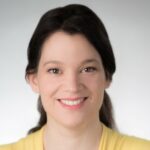Osteosarcopenia
Live Webinar: 11 February 2021, 10 am CET
Jointly organised by ECTS & ECTS Academy.
Date & Time: 11 February 2021, 10am CET
Featuring Gustavo Duque, and moderated by Ursula Heilmeier
Costs: Live webinar is free for ECTS members and non-members, but a registration is required. Recordings are accessible to ECTS members only.
Format:
- 5 min welcome & introductions
- 35 min presentation on Osteosarcopenia
- 20 min Q&A
Learning Objectives:
- To summarise the current evidence on the pathophysiology of osteosarcopenia focusing on the role of mechanical and biochemical factors
- To discuss the risk factors that are shared by osteoporosis and sarcopenia
- To review the results of recent cross sectional and longitudinal studies looking at the clinical phenotype and adverse outcomes associated to osteosarcopenia
- To provide some examples of novel diagnostic techniques and biomarkers for osteosarcopenia
- To review current evidence on the effect of non pharmacological and pharmacological interventions on osteosarcopenic patients
Additional Live Coffee Shop: 11 February 2021, 11 am CET
ECTS is pleased to invite you for an additional “Coffee Shop” informal discussion at 11 am CET, right after the live webinar, in order to meet friends and colleagues with an interest in the bone field for a topical chat. If you are interested in this networking opportunity, please click on the button below to register for the Coffee Shop.
Featuring Gustavo Duque
Prof. Gustavo Duque MD, PhD, FRACP, FGSA is a geriatrician and a clinical and biomedical researcher with special interest in the mechanisms and treatment of osteoporosis, sarcopenia and frailty in older persons. His initial training included Internal Medicine at Javeriana University (Colombia) and Geriatric Medicine, which he completed at McGill University in Montreal (Canada). Subsequently, he obtained his PhD at McGill University in 2003 with a thesis entitled ‘Molecular Changes of the Aging Osteoblast’ under the supervision of Dr. Richard Kremer. Prof. Duque’s major research interests include the elucidation of the mechanisms and potential new treatments for age-related bone loss, osteoporosis, sarcopenia, osteosarcopenia and frailty. He is also looking at the effect of vitamin D, exercise and proteins on bone and muscle mass. He is currently Chair of Medicine and Director of the Australian Institute for Musculoskeletal Science (AIMSS) at the University of Melbourne and Western Health. He is the author of more than 200 peer reviewed articles and of multiple book chapters and has edited 4 books in the ageing and musculoskeletal fields (two of them on Osteosarcopenia). He is also the Director of the Fracture Care and Prevention Program at Western Health (Melbourne). As part of this Program, Prof. Duque implemented a Falls and Fractures clinic at Sunshine Hospital where patients are assessed for falls and fractures risk in a comprehensive manner.

Moderated by Ursula Heilmeier
Ursula Heilmeier, MD, is a musculoskeletal researcher and physician based in Switzerland and the US. She studied medicine at the University of Regensburg Medical School, Germany, where she also received her doctorate for her work in molecular and cell biology on cell differentiation and signal transduction. She spent her postdoctoral research time at the University of California San Francisco, in the Musculoskeletal Quantitative Imaging Research Group where she started studying the healthy and pathological aging of musculoskeletal tissues such as bone and cartilage with a special focus on investigating the metabolic, microRNA, and imaging phenotypes of age-related diseases such as diabetic bone disease, osteoarthritis, and osteoporosis. Dr. Heilmeier has published > 35 original papers and has received several grants and prizes for her work, including the ASBMR Young Investigator Award, the ECTS New Investigator Award, and the ESCEO-AgNovos Healthcare Young Investigator Award.

Abstract
In older persons, the combination of osteopenia/osteoporosis and sarcopenia – known as osteosarcopenia – has been proposed as a subset of frailer individuals at higher risk of institutionalization, falls, and fractures. The pathophysiology of osteosarcopenia is the consequence of a complex set of interactions between bone, muscle and fat that include genetic, mechanical and biochemical factors. Osteosarcopenic patients have very distinct clinical and biochemical characteristics that could be identified in clinical practice. Clinical diagnostic algorithms are being developed and validated to facilitate the diagnosis of osteosarcopenia, which include biomarkers and novel imaging techniques. In addition, new therapies targeting both muscle and bone (including some that involve fat as a new target) are being developed. In this webinar, the pathophysiology of osteosarcopenia will be reviewed. In addition, a phenotype of osteosarcopenia aiming to describe the clinical, functional, and biochemical features that are unique to these patients will be presented. The correlation between imaging and serum levels of adipokines, osteokines and myokines will be discussed. In addition, we will analyze preventive measures and therapeutic interventions that can benefit both muscle and bone simultaneously. We intend to go over the translational aspects of sarcopenia and osteoporosis research, and highlight expected outcomes from different interventions for both conditions.
References
1- Sepúlveda-Loyola W, Phu S, Bani Hassan E, Brennan-Olsen SL, Zanker J, Vogrin S, Conzade R, Kirk B, Al Saedi A, Probst V, Duque G. The Joint Occurrence of Osteoporosis and Sarcopenia (Osteosarcopenia): Definitions and Characteristics. J Am Med Dir Assoc. 2020;21(2):220-225.
2- Kirk B, Zanker J, Duque G. Osteosarcopenia: epidemiology, diagnosis, and treatment-facts and numbers. J Cachexia Sarcopenia Muscle. 2020;11(3):609-618